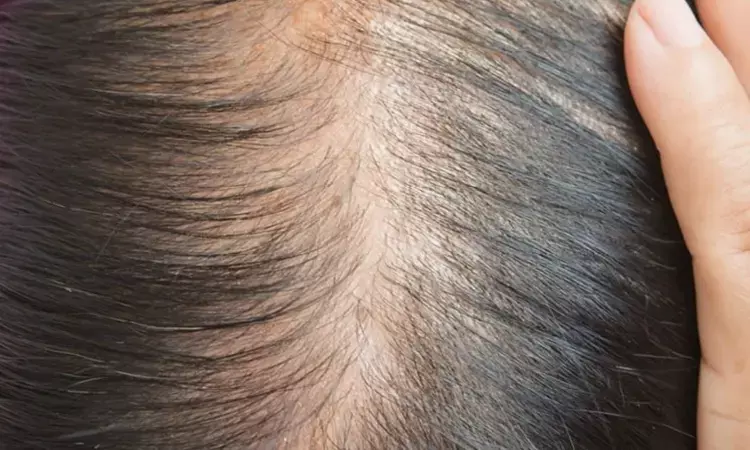- Home
- Medical news & Guidelines
- Anesthesiology
- Cardiology and CTVS
- Critical Care
- Dentistry
- Dermatology
- Diabetes and Endocrinology
- ENT
- Gastroenterology
- Medicine
- Nephrology
- Neurology
- Obstretics-Gynaecology
- Oncology
- Ophthalmology
- Orthopaedics
- Pediatrics-Neonatology
- Psychiatry
- Pulmonology
- Radiology
- Surgery
- Urology
- Laboratory Medicine
- Diet
- Nursing
- Paramedical
- Physiotherapy
- Health news
- Fact Check
- Bone Health Fact Check
- Brain Health Fact Check
- Cancer Related Fact Check
- Child Care Fact Check
- Dental and oral health fact check
- Diabetes and metabolic health fact check
- Diet and Nutrition Fact Check
- Eye and ENT Care Fact Check
- Fitness fact check
- Gut health fact check
- Heart health fact check
- Kidney health fact check
- Medical education fact check
- Men's health fact check
- Respiratory fact check
- Skin and hair care fact check
- Vaccine and Immunization fact check
- Women's health fact check
- AYUSH
- State News
- Andaman and Nicobar Islands
- Andhra Pradesh
- Arunachal Pradesh
- Assam
- Bihar
- Chandigarh
- Chattisgarh
- Dadra and Nagar Haveli
- Daman and Diu
- Delhi
- Goa
- Gujarat
- Haryana
- Himachal Pradesh
- Jammu & Kashmir
- Jharkhand
- Karnataka
- Kerala
- Ladakh
- Lakshadweep
- Madhya Pradesh
- Maharashtra
- Manipur
- Meghalaya
- Mizoram
- Nagaland
- Odisha
- Puducherry
- Punjab
- Rajasthan
- Sikkim
- Tamil Nadu
- Telangana
- Tripura
- Uttar Pradesh
- Uttrakhand
- West Bengal
- Medical Education
- Industry
Alopecia Patients on Low-Dose Minoxidil not at Increased Risk of Pericardial Effusion, suggests study

USA: A new study found no evidence of an increased prevalence of pericardial effusions in a small group of alopecia patients undergoing low-dose oral minoxidil (LDOM) therapy.
The study, published in the Journal of Drugs in Dermatology, has provided new insights into the safety profile of low-dose oral minoxidil therapy for patients with alopecia, focusing specifically on the risk of pericardial effusions. Pericardial effusion, a condition where fluid accumulates in the pericardial cavity surrounding the heart, is a potential side effect of various medications, raising concerns about its occurrence in patients undergoing minoxidil treatment.
"Small pericardial effusions were observed in 5.8% of patients receiving low-dose oral minoxidil, compared to 6% in the control group," the researchers reported.
Minoxidil, traditionally used in higher doses for treating severe hypertension, has gained popularity as a low-dose treatment option for alopecia, a common condition characterized by hair loss. Despite its effectiveness in promoting hair regrowth, concerns have been raised about potential cardiovascular side effects, including pericardial effusion.
Against the above background, Colin M. Kincaid MDa, Department of Dermatology, University of California, Irvine, CAbDivision of Cardiology, University of California, Irvine, CA, and colleagues aimed to examine if low-dose oral minoxidil is linked to a higher prevalence of pericardial effusions in patients with alopecia.
For this purpose, the researchers employed point-of-care ultrasound to screen alopecia patients during dermatology appointments in the cross-sectional study. Two independent cardiologists assessed the scans to identify and measure the size of any pericardial effusions. The prevalence of effusions in patients undergoing low-dose oral minoxidil (LDOM) therapy was then compared with that in patients not receiving minoxidil therapy.
The following were the key findings of the study:
- A total of 100 patients were evaluated for pericardial effusion: 51 LDOM patients and 49 control patients.
- The two groups were similar in terms of age (53.7 versus 54.1), sex (86% versus 73% female), and race.
- Small pericardial effusions (<1 cm) were identified in 5.8% of LDOM patients and 6% of control patients, none of which were symptomatic.
Limitations of the study include its small size and the constraints on drawing causal inferences from confirmed cases.
"While additional studies are needed, this research did not reveal a significantly higher prevalence of pericardial effusions in alopecia patients undergoing low-dose oral minoxidil therapy compared to controls," the researchers concluded.
"The study offers encouraging news for those using low-dose oral minoxidil to manage alopecia, suggesting that it does not significantly increase the risk of pericardial effusions. As always, patients should continue to consult with their healthcare providers to monitor their health and address any potential concerns during their treatment," they wrote.
Reference:
DOI: https://www.jaad.org/article/S0190-9622(24)01069-7/fulltext
Dr Kamal Kant Kohli-MBBS, DTCD- a chest specialist with more than 30 years of practice and a flair for writing clinical articles, Dr Kamal Kant Kohli joined Medical Dialogues as a Chief Editor of Medical News. Besides writing articles, as an editor, he proofreads and verifies all the medical content published on Medical Dialogues including those coming from journals, studies,medical conferences,guidelines etc. Email: drkohli@medicaldialogues.in. Contact no. 011-43720751


